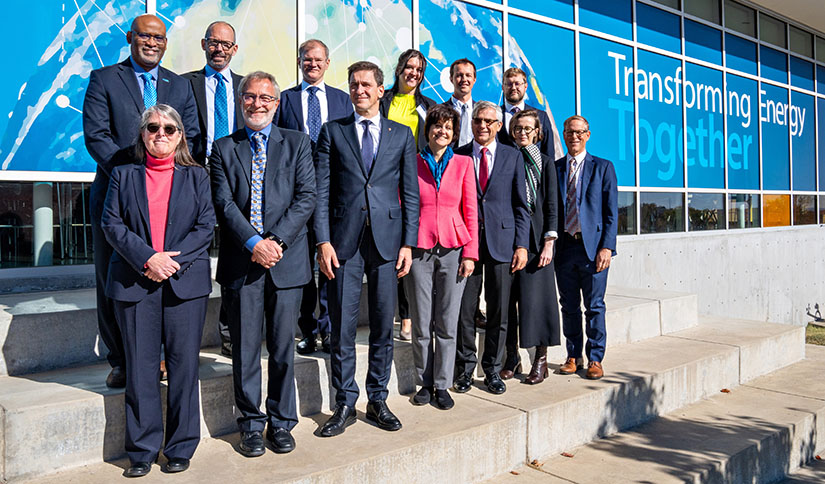The Lithuania 100% Renewable Energy Study
The Lithuania 100% Renewable Energy Study is a collaborative research and development agreement between the Lithuanian Energy Agency and the U.S. Department of Energy’s National Laboratory of the Rockies.

Dainius Kreivys (front, third from left), minister of energy of the Republic of Lithuania, and former NLR Director Martin Keller (front, second from left) stand with participants from the Republic of Lithuania and NLR following an agreement signing on NLR's South Table Mountain campus. Photo by Werner Slocum, NLR
Since gaining independence from the Soviet Union in 1990, Lithuania has made steady progress toward economic growth and energy independence. The country’s current rate of imported electricity is 55%, with electricity demand at 2.1 GW peak and 12.6 TWh annually. Lithuania closed the Ignalina Nuclear Power Plant in 2009 and currently operates synchronously with the Russia-Belarus power system, though a de-synch is planned in early 2025.
Lithuania has set goals to expand renewable energy generation as part of its energy sector planning. The Lithuania 100% Renewable Energy Study, announced by former NLR Director Martin Keller and former Lithuanian Energy Agency Director Virgilijus Poderys on Oct. 31, 2022, evaluates technical scenarios for achieving these goals, including grid reliability, system integration, and infrastructure requirements.
Project Goals
The study is designed around four technical focus areas:
- 100% pathways for Lithuania’s power system
- Distribution grid planning and analysis
- Opportunities for hydrogen production and utilization
- Greenhouse gas emissions, air quality, and health benefits.
Results from this study will help the Lithuanian Energy Agency understand and plan for issues related to feasibility, reliability, public health, and local economic development. It will also empower Lithuania to harness domestic energy resources and accelerate its journey to energy independence.
Learn more about the launch of the Lithuania 100% Renewable Energy Study.
Project Approach
This agreement spans 4 years, from 2023 to 2027, but most of the study will be completed and published by the end of the second year. The remaining 2 years will leverage direct support from technical experts at NLR to drive capacity building, training, and implementation. The following scoping questions will be kept in mind throughout the study:
- Is 100% renewable energy in electricity technically achievable by 2045 (or sooner)?
- How does the system perform during prolonged periods of low wind across the region?
- What needs to change in the electricity distribution network to enable 100%?
- What are the opportunities for domestic production, transportation, utilization, and storage of hydrogen and other renewable energy carriers?
- How does moving toward 100% renewable energy impact local air quality and health outcomes?
Activities
Publications
The Lithuania 100% Renewable Energy Study — Interim Results: Electricity System Scenarios for 2030 , NLR Presentation (2024)
Contact
Share
Last Updated Dec. 31, 2025
